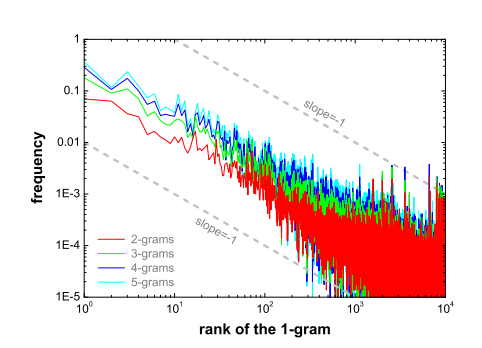The Evolution of English Words and Phrases Since 1520
The digitisation of the world’s books reveals how the popularity of English words and phrases has evolved since the 16th century. And the Top 100 lists for each year are now free to browse online
The digitisation of the world’s books reveals how the popularity of English words and phrases has evolved since the 16th century. And the database is now freely browsable online
Last year, the Google Books team released some 4 per cent of all the books ever written as a corpus of digitised text, an event that has triggered something of a revolution in the study of trends in human thought. The corpus consists of 5 million books and over 500 billion words (361 billion in English) dating from the 1500s to the present day.
In a single stroke, this data gives researchers a way to examine a whole range of hitherto inaccessible phenomena. Since then a steady stream of new results has emerged on everything from the evolution of grammar and the adoption of technology to the pursuit of fame and the role of censorship.
This story is only available to subscribers.
Don’t settle for half the story.
Get paywall-free access to technology news for the here and now.
Subscribe now
Already a subscriber?
Sign in
You’ve read all your free stories.
MIT Technology Review provides an
intelligent and independent filter for the
flood of information about technology.
Subscribe now
Already a subscriber?
Sign in
Today, Matjaz Perc at the University of Maribor in Slovenia uses this data to examine the evolution of the most common English words and phrases since 1520.
As expected, the results show various power laws at play. Power laws are thought to arise in social systems because of a phenomenon of self-organisation called preferential attachment.
This is the idea that in a network, a node with more connections is likely to attract more connections in future. That’s why it is also known the rich-get-richer effect or the Matthew effect (a biblical reference).
So it’s really no surprise that the popularity of words and phrases over time follows a similar law, given that the spread of language can be modelled by a network model.
What’s interesting about Perc’s work, however, is that he’s published the results on his website at http://www.matjazperc.com/ngrams/evolution.html.
Here you can see lists of the top 100 most popular 1, 2, 3, 4 and 5-word phrases for each year of data from 1520 until 2008.
It makes for fascinating browsing. For example, the most popular 5-word phrase in 1520, the first year for which data is available, is “the pope and his followers”. In 2008, the last year for which data is available, it is “at the end of the”.
Worth a look if you have a few minutes to spare.
Ref: arxiv.org/abs/1212.1709: Evolution Of The Most Common English Words And Phrases Over The Centuries
